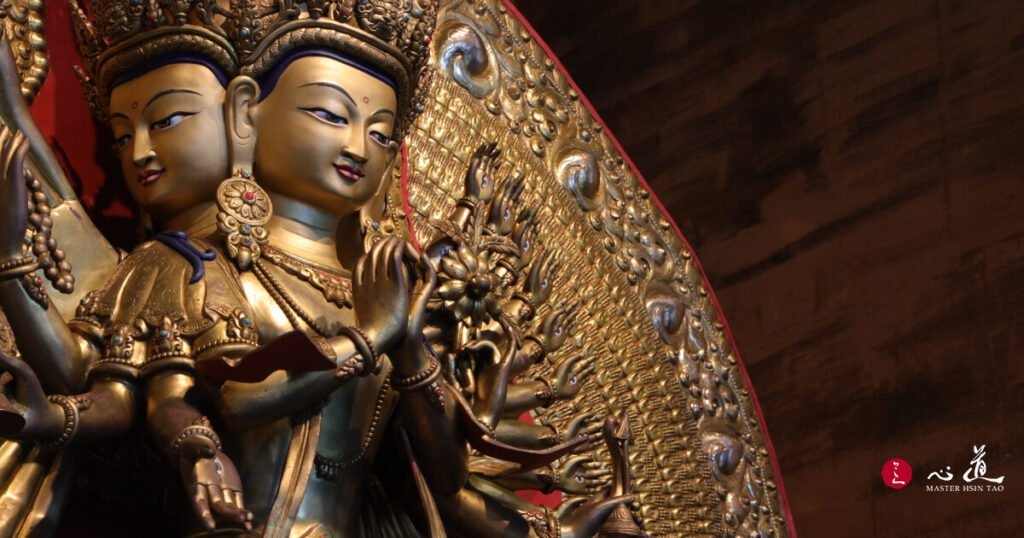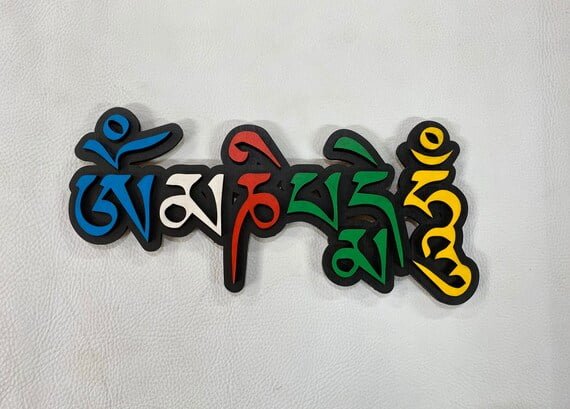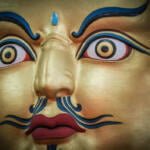Why is Avalokiteśvara’s Mantra So Important?
Avalokiteśvara, or Guanyin, holds a special place in the hearts of those seeking compassion and relief from suffering. The mantra of Avalokiteśvara is not just a set of words; it’s a key to unlock profound spiritual benefits. Vimalamitra, a revered figure in Buddhism, highlights the virtues of Avalokiteśvara’s mantra and name in the “Wish-Fulfilling Treasure Treatise,” alongside the “Mahayana Sublime Treasure King Sutra”.
Vimalamitra (དྲི་མེད་བཤེས་གཉེན་), teaches that merely hearing the name of this sutra prevents one from falling into lower realms, much like the protective power seen in the “Nirvana Sutra” and the “King of Samadhi Sutra.” The merits of this sutra are immense, acting like a fierce fire that burns away eons of negative karma, like pure water cleansing all impurities, and like a strong wind removing every obstacle in body, speech, and mind. Such teachings inspire greater faith in Avalokiteśvara’s mantra, suggesting that it alone is sufficient for spiritual practice.

Unique Blessings of Avalokiteśvara
Reciting Avalokiteśvara’s name stands out from other Bodhisattva mantras. After learning about Avalokiteśvara’s life and the virtues in the “Universal Gate Chapter,” one might feel that focusing solely on Avalokiteśvara surpasses other practices in importance. The “Lotus Sutra” relays Buddha’s words to Bodhisattva Infinite Intent, equating the merit of holding the name of Avalokiteśvara, even briefly, to making extensive offerings to countless Buddhas across billions of eons.
This perspective highlights the unparalleled value of Avalokiteśvara’s mantra over others. It encourages reciting Avalokiteśvara’s name in daily activities, a simple practice yet inaccessible to those lacking merit and virtuous roots.
Rebirth in Tibet: A Blessing
Discussing the benefits of being reborn in Tibet, where reciting Avalokiteśvara’s mantra is a common practice, underscores the mantra’s significance in cultivating compassion and wisdom. The aspiration to be reborn as a Tibetan in future lives to continue this practice reflects a deep appreciation for the mantra’s spiritual value.

Avalokiteśvara’s Mantra in Sutras
The “Eleven-Faced Avalokiteśvara Mantra Sutra” states that the merit of reciting Avalokiteśvara’s name equals that of chanting the names of countless Buddhas. This illustrates the efficiency and potency of focusing on Avalokiteśvara’s mantra, offering a simpler yet equally meritorious path to enlightenment.
Understanding the virtues of Avalokiteśvara’s mantra can transform one’s spiritual practice, emphasizing its importance in overcoming obstacles and achieving enlightenment. By integrating this mantra into daily life, practitioners can deepen their connection to compassion and wisdom, embodying the essence of Avalokiteśvara’s teachings.
The Profound Blessings of Avalokiteśvara’s Mantra
Mipham Rinpoche, in his work “The Hundred Syllable Virtues,” stated, “Avalokiteśvara embodies liberation through seeing, hearing, remembering, and touching.” Anyone who hears Avalokiteśvara’s name or the six-syllable mantra, and keeps in mind Avalokiteśvara’s Thangka, receives immense blessings.
In Tibet, Avalokiteśvara is commonly depicted as having four arms, two arms, or a thousand arms with a thousand eyes. In China, based on the descriptions in the “Avatamsaka Sutra” or the “Lotus Sutra,” Avalokiteśvara has thirty-two different forms.

Regardless of the form, it’s crucial to frequently remember and visualize Avalokiteśvara. This practice gradually transforms and purifies our continuum. Many Buddhas and Bodhisattvas have attained realization through the mantra “Om Mani Padme Hum.”
Encountering such teachings in this life indicates incredibly auspicious karma, unattainable without millions of eons of accumulating merit and purifying sins. Therefore, everyone should take the time to recite Avalokiteśvara’s mantra.
Avalokiteśvara’s Mantra: The Key to a Compassionate Life
Mipham Rinpoche mentioned, “In the age of degeneration, Avalokiteśvara and Tara’s blessings are most effective and easily felt.” Thus, numerous miraculous responses to Avalokiteśvara’s practice exist in both Tibet and China.
A Hundred Million Chants to Bliss: Avalokiteśvara’s Mantra Journey
When the Dharma King visited places like Do Kham and Amdo, if someone suggested reciting Amitabha Buddha’s name a hundred million times, it seemed daunting. Yet, when it came to reciting a hundred million Avalokiteśvara mantras, thousands would readily agree, finding it much easier.
China should also promote the recitation of Avalokiteśvara’s mantra. Have the elderly or the youth vowed to recite Avalokiteśvara’s mantra a hundred million times? Many might fear this due to a lack of mental strength. In Tibet, vowing to recite the mantra a hundred million times is considered easy.
However, some people from other cultures are astonished at the idea of reciting the mantra a million times, wondering how they could ever complete such a task. Yet, they find it easy to engage in harmful actions, consuming bowls of insects or plates of fish and shrimp, with courage that they lack when facing spiritual practices.

Therefore, those with heavy habits and afflictions must strive for change. Achieving this can lead anyone to realization. In India, an 80-year-old once recited the Avalokiteśvara mantra a hundred million times, gaining the attainment of long life and clear vision. After living for 300 years, he directly entered the Pure Land of Bliss.
Don’t be overly intimidated by reciting this mantra; it’s essential to practice it. The merits of reciting it are numerous, but it’s impossible to cover them all in such a short time today.



















